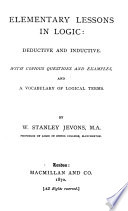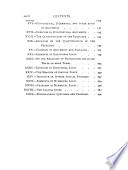 | William Stanley Jevons - Logic - 1870 - 420 pages
...the conclusion. 3. The middle term must be distributed once at least, and must not be ambiguous. ; 4. No term must be distributed in the conclusion which was not distributed in one of the premises. 5. From negative premises nothing can be inferred. 6. •• If one premise be negative, the conclusion... | |
 | H. Coleman - 1870 - 156 pages
...have been both compared to the same. Illicit Process of Major and Minor. — 4. A term must not not be distributed in the conclusion which was not distributed in one of the premises, for that would be to employ the whole of a term in the conclusion, when you had only employed a part... | |
 | William Stanley Jevons - Logic - 1872 - 450 pages
...These propositions are called the major premise, the minor premise, and the conclusion. 4. No ferm must be distributed in the conclusion *which was not distributed in one of the premises. 5. From negative premises nothing can be inferred. 6. If one premise be negative, the conclusion must... | |
 | William Chauncey Fowler - English language - 1873 - 814 pages
...light; therefore Feathers are contrary to darkness, or a term not distributed. II. Illicit Process. — No term must be distributed in the conclusion which was not distributed in one of the premises, for that would be to employ the whole of a term in the conclusion, when you had employed only a part... | |
 | John Harrison Stinson - Philosophy - 1879 - 220 pages
...syllogising correctly, we conceive to be, not only of no value, but erroneous. The fifth rule given, is that No term must be distributed in the conclusion,...which was not distributed in one of the premises. "All quadrupeds are animals, a bird is not a quadruped, and therefore a bird is not an animal." This... | |
 | William Stanley Jevons - Logic - 1879 - 364 pages
...the conclusion. 3. The middle term must be distributed once at /fast, and must not be ambiguous. 4. No term must be distributed in the conclusion which was not distributed in one of the premises. 5. From negative premises nothing can be inferred. 6. If one premise be negative, the conclusion must... | |
 | William Stanley Jevons - Philosophy - 1880 - 370 pages
...premise, the minor premise, and the conclusion. (3) The middle term must bc distributed once at least. (4) No term must be distributed in the conclusion which was not distributed in one of the premises. (5) From negative premises nothing can bc inferrcd. (6) If one premise bc negative, the conclusion... | |
 | Oxford handbook - 1880 - 36 pages
...three propositions. 3. The middle term must be distributed at least once, and must not be ambiguous. 4. No term must be distributed in the conclusion which was not distributed in one of the premises. 5. If both premises be negative, no conclusion can be drawn. 6. If one of the premises be negative,... | |
 | Alfred Milnes - 1880 - 140 pages
...an argument is evident at a glance, and hence we have our second syllogistic rule: — Rule II.— No term must be distributed in the conclusion which was not distributed in the premisses. The breach of this rule gives rise to a fallacy known as Illicit Process. Illicit processes... | |
| |